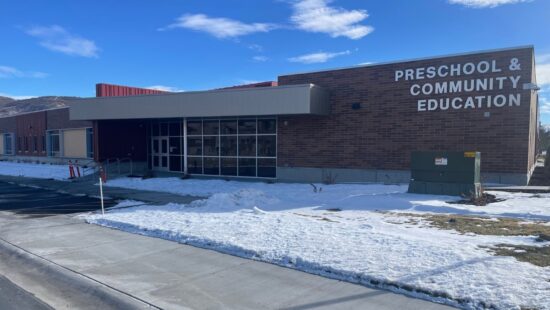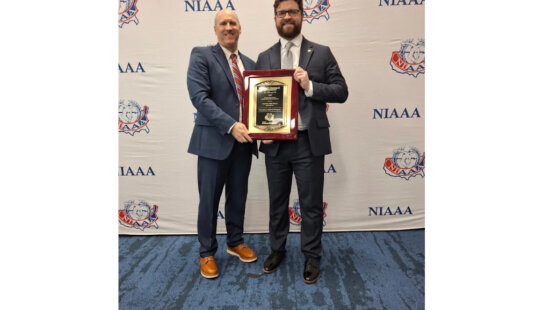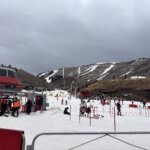News
Park City teachers grapple with parent efforts to restrict LGBTQ speech
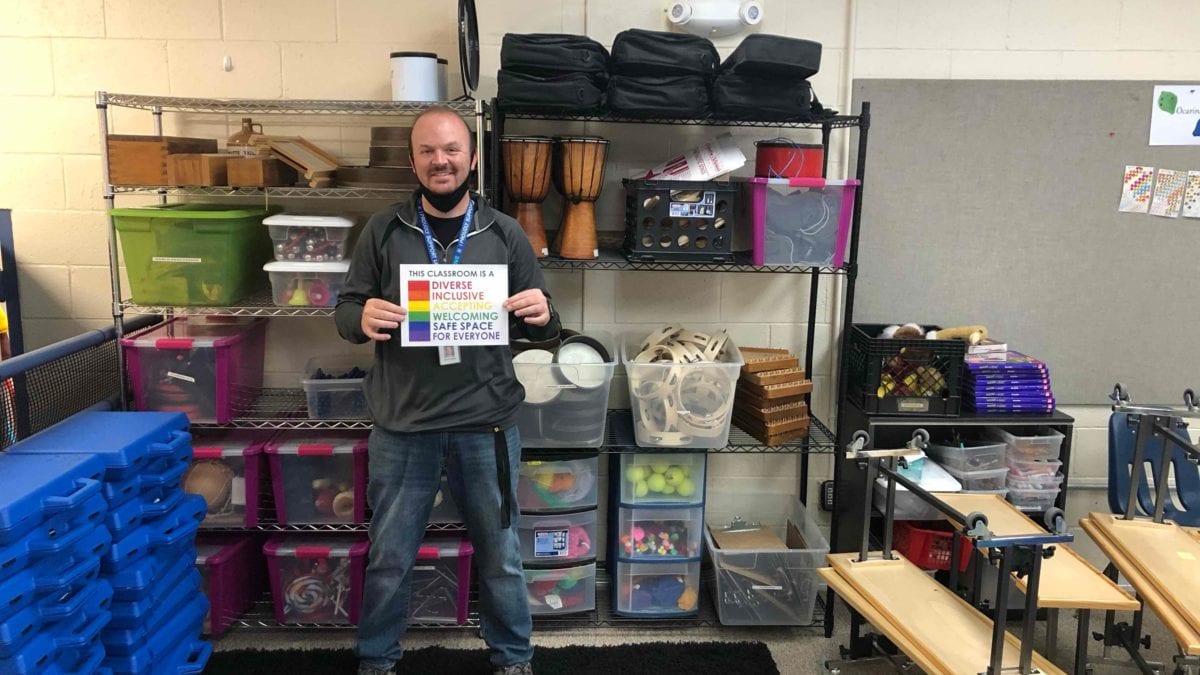
Aaron Webb, who teaches music at Parley's Park Elementary School and is vice president of the PCSD teacher's union, holding one of the signs displayed throughout the school. Photo: TownLift
PARK CITY, Utah. — At Parley’s Park Elementary School, rainbow-toned posters celebrating diversity, equity and inclusion adorn classroom walls. Aaron Webb, who teaches music there, is forming a diversity and equity committee within the local teachers association.
At Ecker Hill Middle School, LGBTQ representation and speech is spottier. Choir teacher Mary Morgan said her classroom discussions sometimes address the intersection of art and politics, and LGBTQ topics arise regularly. Math teacher Phil Nighosian said he does not know if he is legally allowed to discuss LGBTQ topics, and that if something LGBTQ-related arose in his classroom, he would send students involved to the counseling office. And French teacher Lucie Kayser-Bril said she was told by Principal Amy Jenkins not to mention LGBTQ topics in her classroom and not to use books or videos with same-sex characters or themes.
For LGBTQ students, families, faculty, and staff in the Park City School District, experiences vary significantly from campus to campus, even classroom to classroom. The constant, according to more than a dozen teachers interviewed on PCSD campuses representing all grade levels, is a pervasive culture of fear – of parents – that mirrors statewide trends.
“All across the state there seems to be a reverberation,” said Heidi Mathews, president of the Utah Teachers Association. “It’s problematic because it’s not factual. We can’t silence conversations about facts.”
That sense of frustration extends to the highest levels of Utah schools’ government.
“What a few vocal parents want trumps the law—and reason,” said Carol Lear, a Utah State Board of Education (USBE) member. “How teachers say things is unfortunately really under scrutiny right now; it’s really precarious for teachers.”
A recent episode in Murray, in which a teacher irked some parents by reading a book with a transgender character to students, resulted in that district suspending a reading program designed to highlight diverse literature after parents complained.
Several PCSD teachers discussed the topic privately but declined to be quoted out of fear for their jobs. But others, particularly those further along in their careers, spoke on the record about frustration over efforts to restrict speech and classroom curriculum being made by a small but determined group of parents.
“Part of my responsibility as a teacher is to find and show things that are representative of my student body,” said EHMS language arts teacher Cailin Davis. “I find especially in recent years the most controversy comes from parents contacting the school or teachers directly, asking that things not be taught or mentioned or books not offered.”
Davis said she personally knew of teachers removing class materials and self-censoring this year, but did not share details.
In choir, Morgan said, “(I tell students) we want to be respectful of LGBTQ issues. In class when I’m mentioning LGBTQ issues the kids kind of snicker, and I tell them that’s inappropriate.”
But, she acknowledged, “where I’m coming from is a different place than, say, a first-year teacher. It can be a little touchy, not because of the kids but because we tiptoe around parents in Park City. Why should we?”
Kayser-Bril recounted a recent episode that highlights how much impact one disgruntled parent can have on a classroom over what could be characterized as differences in cultural and religious beliefs.
“To supplement a unit on family and community, I showed a music video that speaks about gay adoption rights in France. The students were extremely engaged, respectful, and interested during the short discussion that followed,” she said. “However, after one parent expressed their concern, I was asked to stop using supplementary materials and stick to the textbook.”
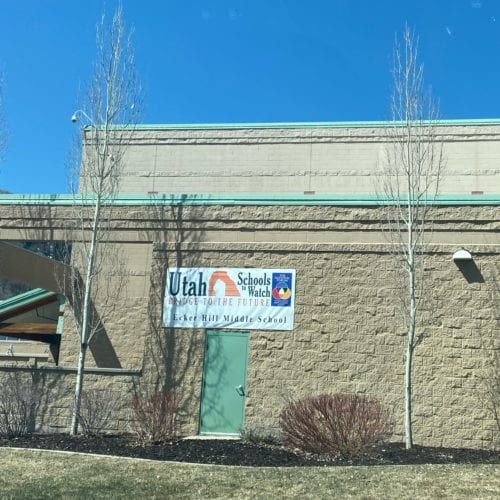
Kayser-Bril said Jenkins told her not to use materials with the word ‘gay.’ Jenkins also suggested she write an apology to the parent who had complained, which Kayser-Bril did, then sent to Jenkins to be forwarded to the person who had complained.
Jenkins did not respond to requests for comment, and Superintendent Dr. Jill Gildea said she was unaware of policies on any campuses banning references to LGBTQ people or discussion.
“The relevant question is how do we, as a healthy community, learn and grow together and bring forward policies, programs, and materials that respect, protect and further the interests of ALL parents in their children’s public education; and promote full and active participation and involvement of ALL parents at ALL public schools,” Gildea said in an email.
In a populous district encompassing a wide range of ideological beliefs, it is surely impossible to please everyone. How, then, can schools manage divergence? USBE codes and education standards lay the groundwork for navigating the waters.
The 2017 repeal of Utah’s anti-gay curriculum law (known as ‘no promo homo’) was followed in September of that year by a USBE letter to local education agencies (LEAs) statewide to flesh out what the repeal meant in practice. It said, in part:
- The Utah State Board of Education desires each student in Utah public schools to receive a high-quality education free from all manner of discrimination . . . based on religion, race, ethnicity, gender, sexual orientation, and gender identity.
Clifford Rosky, a University of Utah law professor who helped draft the repeal legislation, said by email that the USBE rule implementing the repeal “explicitly applies to courses on any subject. In R277-474-2(3), the rule states: ‘Sex education instruction or instructional programs’ means any course, unit, class, activity or presentation that provides instruction or information to students as outlined under Section 53G-10-403(1)(a). And in R277-474-3(5), the rule specifically states: ‘While sex education instruction and related topics are most likely to take place in such courses as health education, health occupations, human biology, physiology, parenting, adult roles, psychology, sociology, child development, and biology, this Rule R277-474 applies to any course or class in which these topics are the focus of discussion.'”
Therefore, Rosky said, “a public school may not prohibit teachers from discussing LGBTQ people or issues. Such a policy would explicitly discriminate against LGBTQ students, and the children of LGBTQ parents.”
Some PCSD educators and administrators expressed an assumption that LGBTQ conversations are automatically of a “personal, sensitive” nature and therefore the domain of a counselor’s office or a health class, rather than a regular part of various discussions – for example, a talk about mathematician Alan Turing in a math class could involve history, science, and societal persecution without being personal or sensitive. Gildea said such confusion highlighted why employees would request training.
Lear, from the USBE, said that interdisciplinary discussions were natural and beneficial to student learning.
“It’s so simplistic to believe (SB196) only applies to health instruction,” she said. “In history, literature, sociology, those issues come up.”
Despite current law, teachers said their headaches have grown since 2019, when a Park City parent group alleged that the Welcoming Schools program amounted to “indoctrination and sex education” for elementary school students.
Welcoming Schools is anti-bullying teacher training addressing in part how teachers can handle classroom incidents in ways that promote equity and inclusion. Trailside Elementary School utilized it after several LGBTQ-related bullying incidents there.
After teachers attended one session, some Trailside parents formed an anonymous group called Stop Welcoming Schools. The group hired a lawyer, who sent cease-and-desist demands to the district and threatened a lawsuit. Shortly thereafter, that training program was cancelled at the state level; public records show a lawsuit was never filed.
Gildea said that while Welcoming Schools is no longer offered, Utah schools have equivalent material available from the state.
“Anti-bullying training is required for new employees and for all school employees at least once every three years,” Gildea said. “That anti-bullying training must include information on bullying based on various actual or perceived characteristics, including gender identity and sexual orientation or failure to conform with stereotypes.”
Middle school, which generally correlates with puberty for students, can be a vulnerable and awkward time. Morgan and other Ecker Hill teachers said they frequently field requests from students regarding new nicknames and pronouns, as some begin navigating questions about sexuality and gender identity.
In such situations, training, knowledge, and district support can be crucial to both student and teacher well-being, health and education officials said. As can people’s ability to see themselves reflected in the world around them and talk about their lives.
Webb, the Parley’s Park teacher, recently met with the Park City High School gay-straight alliance student club to discuss ways to support the LGBTQ community on his campus. He said he received excellent information, which he synthesized in a note to his principal to share with other teachers. He also sent a copy to Dr. Amy Hunt, chief academic officer for the district, and suggested she share it with other campuses. He hasn’t heard whether that will happen.
“I am not concerned about parents being mad at me. I’m concerned about student welfare,” Webb said. “Obviously parents should be involved in their kids’ education, but sometimes we need to educate parents too.”
















